
Auto Tips & Advice
Tire inflation is an important factor to ensure your safety and that of your passengers. If your tire pressure is incorrect, it can also impact your vehicle's operating costs through premature tire wear and higher-than-normal fuel consumption.
In this article, you will learn when you should check your tire pressure and how to inflate tires in 3 simple steps. You will see that tire inflation has to be done differently depending on whether your tires are cold or warm and that the spare wheel should also be checked regularly, although not as often as the other tires.
We will also address the question of the portable tire inflation compressor as an alternative to gas stations and help you decide if you should inflate tires with nitrogen.
What are the risks when your tires are not properly inflated?
If your tires are underinflated
- They increase fuel consumption
- They wear out faster and more irregularly. The life of a tire underinflated by 20% can be reduced by 20%. Example: for a potential mileage of 25,000 miles, your tire could last 5,000 miles less.
- Road handling is hazardous and they generate heating effects which can, at high speed, go as far as bursting the tire.
- May also increase CO2 emissions.
If your tires are overinflated
- Their lifetime is reduced due to accelerated wear in the central part of the tread
- Road handling is hazardous, especially on wet roads.
When should you check your tire pressure?
A tire naturally loses air: usually around 1.45 psi per month (.1bar). This phenomenon can also be accelerated by other sources of leakage due to:
- ambient air temperature: can lose 1-2psi per 10 degrees F
- an accidental puncture
- a defective valve: it must be replaced each time the tire is changed (including valves with pressure sensor)
- the absence of a valve cap: it is essential to guarantee a good seal
- the condition of the rim: it must be cleaned each time a tire is fitted
That is why we recommend checking your tire pressure once a month and before a long car trip.
You can find more information about the causes of pressure loss in this article.
If you do not use your tires for a long time, for example, if you change your tires twice a year to alternate summer/winter tires, it is essential to check the pressure when refitting them on your car.
A properly inflated tire is safer, more economical and more eco-friendly!

How to inflate tires in 3 steps
Step 1: Find the recommended pressure for your tires
Do not look for the recommended pressure on the sidewalls of your tires, it is not there!
You will usually find the recommended pressure:
- On a sticker on the driver's door pillar or on the back of the fuel filler flap
- In the vehicle user guide generally placed in the glove compartment
- You can also use our pressure calculator
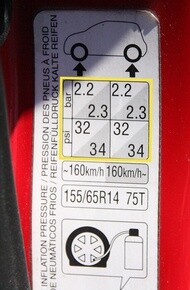
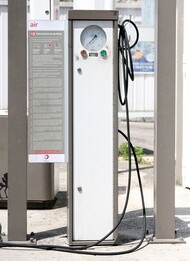
Step 2: Check your tire pressure
- Go to a tire inflation pump in a service station
- Insert the inflator's mouthpiece into the valve on your tire
- The tire inflation gauge displays the internal pressure in bars or PSI
- The hiss you hear is issued by the air escaping from the tire. This should not seriously affect your tire pressure.
Step 3: Adjust your tire pressure
- Compare the displayed pressure on the tire inflation gauge with the recommendation of your vehicle manufacturer
- If it is above the recommended pressure, release air to reach the desired level
- If it is lower than the recommendation, inflate tires to the recommended level.
How to inflate tires when they are cold or warm?
- Check the pressure preferably when the tires are cold (your car should not have been used in the last 2 hours or should have travelled less than 2 miles at low speed)
- If, however, the pressure is checked while the tires are warm, add 0.3 bar (4.35 PSI) to the pressure recommended by the vehicle manufacturer. The pressure should then be checked and readjusted when the tires are cold.
- Never deflate a warm tire (pressure increases with temperature).
Should the pressure of the spare wheel also be checked?
Since a tire naturally loses air, it is of course necessary to check your spare tire as well. However, since this tire is not used every day, you can do it only once or twice a year
The importance of a calibrated tire inflation gauge
Be careful if you use a tire inflator in a petrol station: their tire inflation gauge is not always calibrated, hence not always reliable.
For this reason, it is important:
● to have the pressure checked occasionally by a professional
● or to check the tire pressure yourself with a calibrated pressure gauge (you can find them in specialized stores)

The portable tire inflation compressor: an alternative to gas stations
A portable air compressor is an accessory that sends compressed air into your tire. Depending on the model, it plugs into the cigarette lighter socket or into a power socket. Its built-in pressure gauge allows you to ensure the correct pressure in your tires.
Where can you find a portable tire inflation compressor?
You can find a portable compressor in automotive accessory stores and some supermarkets.
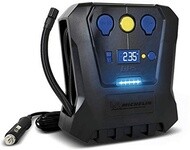
Should you inflate tires with nitrogen?
What is nitrogen?
Nitrogen is air from which oxygen has been removed. About 79% of the air is nitrogen.
How is nitrogen used?
During assembly, the tires are mostly inflated with compressed air. But some professionals may propose exclusively nitrogen-based inflation. Most tires can be inflated with air or nitrogen, as long as the pressure recommended by the car manufacturer is observed. Nitrogen and compressed air can mix very well (when adding pressure, for example).
Benefits of nitrogen
Nitrogen molecules are larger than Air so when nitrogen is substituted for compressed air your tires lose less air and stay longer at the desired pressure.
Check your tire pressure, even when your tires are inflated with nitrogen
Unfortunately, there are other possible sources of leaks (tire/rim contact area, valve, valve/rim junction, etc.), and neither air nor nitrogen can keep the correct pressure indefinitely.
Be sure to check your tire pressure at least once a month and before a long trip.
Where to inflate tires with nitrogen?
This service is usually available at tire service specialty shops, such as Tire Kingdom, Costco, or Discount Tire.
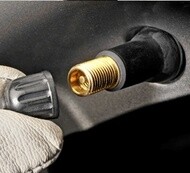
What is the use of the tire valve?
- It keeps the tire pressure at the recommended level
- It prevents moisture from entering into the tire
- The cap plays an essential role in preventing dust from clogging the valve, and ensures its tightness. We recommend that you use good quality caps.
How to check tire pressure
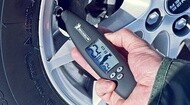
Tires have been known to lose up to 1psi (pounds per square inch) every month, so check all tires, including your spare, once a month (or before a long trip). It’s easy.

Find a Dealer
Search by
Address, City or ZIP code

